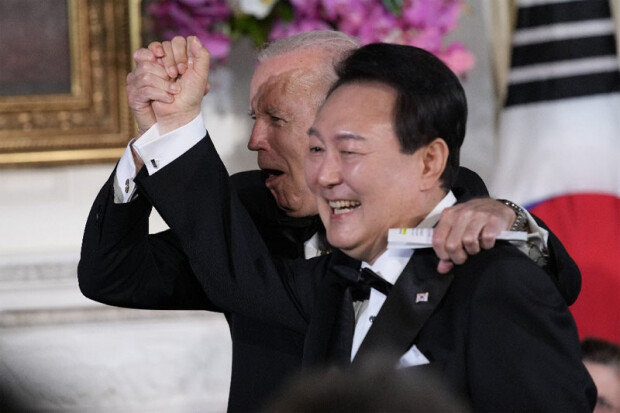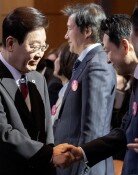Biden: A nuclear attack on US ally will end N. Korean regime
Biden: A nuclear attack on US ally will end N. Korean regime
Posted April. 28, 2023 08:14,
Updated April. 28, 2023 08:14

At a joint press conference with President Yoon Suk Yeol after the ROK-US summit held at the White House on Wednesday (local time), President Joe Biden said, “A North Korean nuclear attack against the United States or its allies is absolutely unacceptable, this will mean the end of the North Korean regime.” It is the first time President Biden has directly warned of "the end of the regime." President Yoon also asserted, “(President Biden) promised to take a swift, overwhelming and decisive response using all the forces possessed by the alliance, including U.S. nuclear weapons, after immediate consultation between the leaders of South Korea and the United States in the event of a nuclear attack by North Korea.”
Regarding the "Washington Declaration," a plan to strengthen the extended deterrence (nuclear umbrella) of the United States, and the establishment of the South Korea-U.S. Nuclear Consultative Group (NCG), President Biden directly mentioned that the response using nuclear weapons is implied should North Korea attack South Korea. "This is the direct pledge of the U.S. president that if North Korea attempts to use nuclear weapons or actually uses them, the U.S. will immediately make a preemptive strike to make the place where the attack was initiated disappear," a high-ranking official in the presidential office said. According to the joint ROK-US statement on the U.S. CHIPS Act and the Inflation Reduction Act (IRA), which could potentially harm South Korean businesses," We agreed to consult closely to ensure mutually beneficial corporate investment in the United States by helping these laws create predictable conditions for business operations.”
While President Yoon garnered some achievements in key initiatives in the security and economic areas needed at this summit, he seemed to be more sympathized with the U.S. to pressure China on Taiwan-semiconductor-related issues that President Biden wants.
The joint statement included, “The two countries oppose economic coercion and the use of opaque instruments involving foreign companies and will work together to counter economic coercion.” The U.S. government, leading up to the summit, is reported to have requested that South Korean companies not make up for the lack of semiconductors in China if China bans the sale of semiconductors by Micron, the largest chipmaker in the U.S. Such wordings are interpreted as opening up the possibility for the South Korean government to grant the U.S. request, which will increase the burden on South Korean chipmakers. The statement also aimed at China, with the remark regarding the Taiwan and South China Sea issues, "Seoul and Washington strongly oppose any attempt to change the status quo by unilateral force,” which China has reacted strongly. The statement also includes the content that South Korea and the U.S. will continue to support Ukraine through security assistance and other means,” which is seen as opening up the possibility of military aid to Ukraine from South Korea. This indicates that President Yoon has reinforced a front commonly shared by the U.S. on issues that China and Russia are against. There are observations that after the ROK-US summit, managing China risks, etc., has emerged as a new challenge for the current administration as South Korea could become tangled up in a new Cold War landscape in which it will inevitably be put at odds with North Korea, China, and Russia at the same time.
Kwan-Seok Jang jks@donga.com







